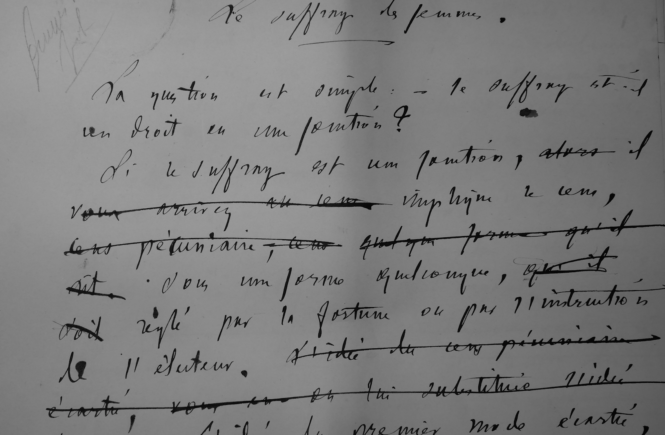What is the argument of opponents of women’s suffrage? Their incapacity, their feeble mind, their ignorance! They proclaim, by this very fact, that universal suffrage is a function. Men are sole responsible for regulating it. They establish themselves as the sovereign judges of the aptitudes of those who are to fulfill it. They claim to be the only ones capable of doing so; all of them are capable; and being the strongest, they exclude all women. After having banned half the nation from that role, they pompously declare that they have established universal suffrage. It is the oligarchy of sex substituted for the oligarchy of money.
French classical liberals and the issue of women’s rights
It is tempting for a liberty-minded historian to leave untouched the comforting presumption that French classical liberals, who championed freedom for the individual in the 17th, 18th and 19th centuries, must have upheld women’s rights too. Contemporary studies, while often obliterating the role of men in the development of feminist rhetoric, have found occasionally in the history of ideas some remarkable advocates well ahead of their times, and they have offered them as objects of uncritical admiration, in a sort of reconciliatory carnival. One easily concludes that feminism was burgeoning in every century, and that the rising tide was lifting up all boats. […]
The United States through the eyes of French classical liberalism
In the 18th and 19th centuries, French classical liberals have often seen the United States as an example and a model. Yet, if some have loved this country in a sort of long-distance relationship, others have actually made the travel and have written detail accounts. In this article, Benoît Malbranque examines the praises and criticisms put forward by authors such as Volney, Tocqueville or Gustave de Molinari, regarding the social and economic situation of the United States.
Turgot, Why the inequality in the division of property is inevitable (1766)
A man of greater strength, more laborious, more attentive about the future, would occupy more than a man of a contrary character. He, whose family is the most numerous having greater wants and more hands, extends his possessions further; this is a first cause of inequality.—Every piece of ground is not equally fertile; two men with the same extent of land, may reap a very different harvest; this is a second source of inequality. Property in descending from fathers to their children, divides into greater or less portions, according as the descendants are more or less numerous, and as one generation succeeds another, sometimes the inheritances again subdivide, and sometimes re-unite again by the extinction of some of the branches; this is a third source of inequality. The difference of knowledge, of activity, and, above all, the oeconomy of some, contrasted with the indolence, inaction, and dissipation of others, is a fourth principle of inequality, and the most powerful of all: the negligent and inattentive proprietor, who cultivates badly, who in a fruitful year consumes in frivolous things the whole of his superfluity, finds himself reduced on the least accident to request assistance from his more provident neighbour, and to live by borrowing.



